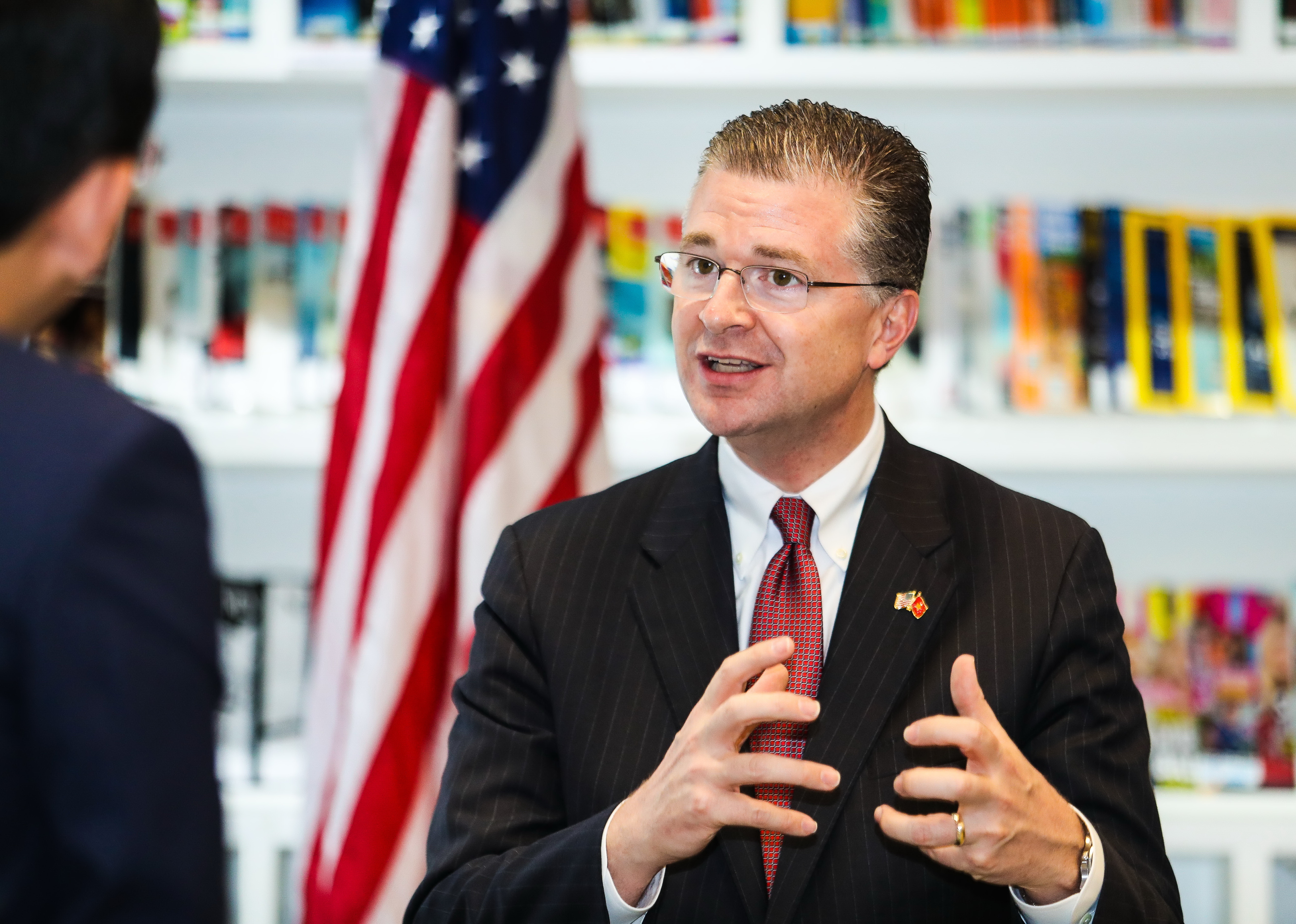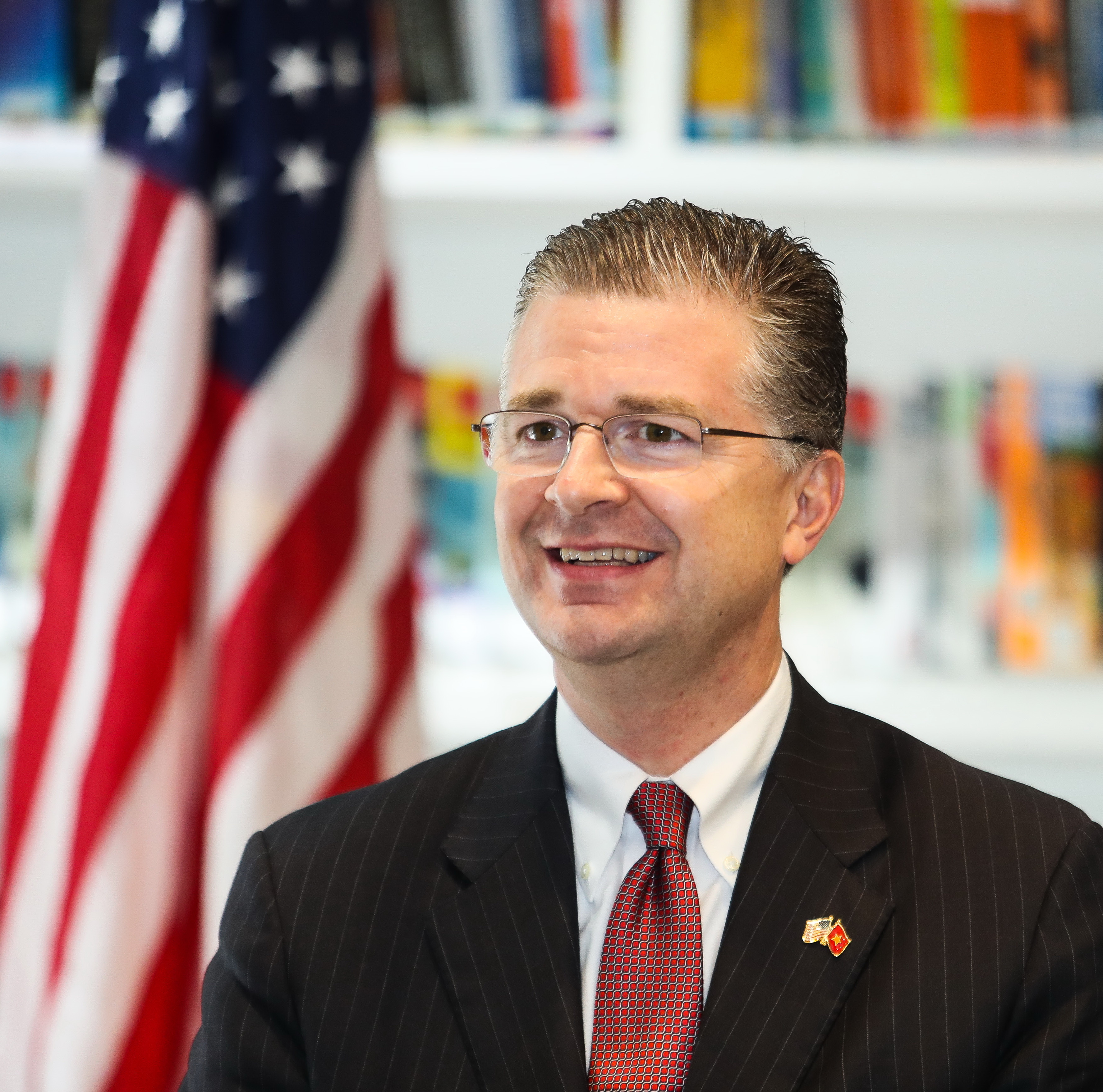He was already on an airplane to Hanoi just a week after being officially confirmed by the Senate as the new U.S. ambassador to Vietnam.
Sleeves rolled up, he was ready for his first mission as the ambassador: to prepare for U.S. President Donald Trump’s attendance at the APEC summit in Da Nang, running from November 6 to 11, and his state visit to the Vietnamese capital from November 11 to 12.
He is Daniel J. Kritenbrink, a career diplomat with varied experience in Asia.
The Senate confirmed Kritenbrink as the new ambassador to Vietnam in October.
He replaced Ted Osius, who still stays in Vietnam after his ambassadorship.
Kritenbrink has served as an American diplomat since 1994. He was the Senior Advisor for North Korea Policy at the Department of State.
A former Deputy Chief of Mission in Beijing, China, Kritenbrink has held senior leadership positions at the Department of State and served as a Senior Director at the National Security Council.
"Hi my friend, please call me Dan." That was how Kritenbrink started his exclusive interview with Tuoi Tre News on November 16 in Hanoi, his first-ever formal contact with local media in his new role.
Have you ever thought that you will one day become a U.S. ambassador to Vietnam? How was your feeling when President Trump nominated you?
I am so honored to be a new American ambassador to Vietnam. As a career diplomat, I always want to serve my country and welcome all opportunities to do so. Truly, it is a dream come true for me to be able to represent the U.S. in such an important country like Vietnam. I’m particularly excited to be here because I am so optimistic about our future partnership.
I believe and the U.S. government believes our partnership with Vietnam is one of our most important relationships in the entire region, if not the entire world. I feel a sense of responsibility as well. I can guarantee I will work very hard to make sure we expand our cooperation across the board.
What did your family think when they first heard that you would become the new ambassador to Vietnam and that they would have to move to Vietnam with you? Do they have any expectations living in Hanoi given that it is a foreign land with a very different language and culture?
They are so excited to come here. My family has never been here before, even though this is my fourth time here.
As you may know, we live in Northern Virginia. There is a very large Vietnamese community there. Our favorite restaurants are Vietnamese and we always go to those restaurants close to our house.
We are looking forward to coming here having some real Vietnamese food on the ground here. As I said in my welcome video, we look forward to traveling across Vietnam and making a lot of Vietnamese friends. I do want to study Vietnamese. I had studied it for a couple of months before I came here so it is not very good yet.
Apart from five priorities you stated in your testimony before the Senate, is there any other specific area that you are interested in and want to personally get involved in regarding the Vietnam-U.S. relationship?
I tried to lay out five priorities in our partnership because I do think those are among the most important ones that include: trade and investment, security, people to people ties, advancing human rights, and dealing with humanitarian and war legacies. One thing I would say I want to emphasize is I do want to spend a lot of my time promoting people to people ties, getting smart Vietnamese students to travel to the U.S., getting young Americans to travel and study here and making sure that tourists and businesspeople go back and forth. I think it is a foundation for our brighter future to make sure two peoples understand one another, respect one another. Personally, I was an international student when I was younger and it completely transformed my life and helped me become a diplomat. So, I would like to bring many Vietnamese students to study in the U.S. and vice versa.
President Trump paid an official visit to Vietnam during his first year in office. What does it mean to the Vietnam-U.S. relationship, in your opinion? What role does Vietnam play in the "free and open" Indo-Pacific President Trump has called for?
We think that President Trump had a tremendously successful visit here. First, the president and the entire team and all of us are deeply grateful for the tremendous hospitality and warm welcome the president has received, both from Vietnam’s top leaders, particularly President Tran Dai Quang, Prime Minister Nguyen Xuan Phuc, and Party General Secretary Nguyen Phu Trong, and from the Vietnamese public. The president was very touched by that. It is so wonderful to see so many Vietnamese friends rushing out in the street, welcoming the president and cheering him.
 |
| Daniel J. Kritenbrink, U.S. Ambassador to Vietnam, gestures during an interview with Tuoi Tre News in Hanoi on November 16, 2017. Photo: Nguyen Khanh/Tuoi Tre News |
I think the president’s main objective when coming here was to demonstrate the U.S. is a strong and committed partner both to Vietnam and the entire Indo-Pacific region as a whole. The bilateral joint statement both sides issued during the president’s visit will be a blueprint and outline for our partnership in the years to come. Our security cooperation is expanded. In trade and investment, we have signed commercial deals worth US$12 billion. Our education cooperation is strengthened through Fulbright University. We have agreed to deal with war legacy issues like our commitment to eradicate dioxin at Bien Hoa Airport and the Vietnamese government has agreed to give us a new piece of land for rent to build a new building for the U.S. embassy.
President Trump said the U.S. wants strong and independent partners around the world and around the Indo-Pacific region. We invest in your success, we want to have partners that are strong, independent and engaged in free trade and don’t rely on a state-run economic model.
Speaking to Vietnamese leaders, President Trump said Vietnam and the U.S. have many things in common and trade has become a very important element of our relationship. He looked forward to "fair and reciprocal" two-way trade considering a deficit favoring Vietnam and the U.S. is now Vietnam's largest market. Could you share with us how to approach this target in the years to come?
The president was very clear in his public remarks as well as in his comments to Vietnamese leaders. The U.S. is very interested in pursuing fair and reciprocal trade. There are tremendous economic opportunities in Vietnam and I think our trading relationship is mutually beneficial. I think American companies are some of the best in the world. We have the best services and the best products that contribute significantly to Vietnam’s objectives, developing your economy and engaging in your economic reforms, and again to promoting prosperity to Vietnamese people. We want to be a part of that. Sometimes there are policies in place that discriminate American companies against other foreign firms. Also, there are barriers to fair competition. I think that is where the president focused on and he wants to advance our trading partnership. He wants to make sure all are mutually beneficial.
I think trade is a key pillar for our bilateral relationship so we want to focus on that again. There are so many tremendous opportunities. Vietnam is America’s fastest-growing export market. I will do everything I can to help American businesses here. I want to highlight the products and services American businesses can offer. If there are challenges or problems on one side or the other, I will try to involve myself and the great team at the embassy to see what we can overcome.
Do you think there are any new emerging challenges between Vietnam and the U.S. under Trump presidency, especially in trade and investment? If yes, what can we do to address them?
There are always challenges in relationships, even in my personal relationship. What I would like to focus on are the tremendous opportunities in the U.S.-Vietnam relationship. I am very optimistic about our future as my friends and the U.S. government are now. We see tremendous potential for this relationship. Our security collaboration is expanding dramatically because we have so many interests in common, whether it is related to the [East Vietnam Sea] or combating terrorism. To address these challenges, both sides need to focus on building mutual trust and mutual respect. We are doing a great job. I think our relationship will continue to grow.
My expectations from the Vietnamese side are that we will continue the great work we have done over the last several years. As an American diplomat, it is particularly emotional to see how far we have come over the last 20 years. We have overcome the painful part of our history, we reconcile to build a good foundation for our relationship. On that foundation, we have done all tremendous things in terms of economics and trade, security, and people to people ties. Even 20 years or 40 years later, we still need to spend time focusing on these issues because they remain important to our relationship. That’s the reason why we commit to further dioxin eradication at Bien Hoa Airport. Both sides are working on very important missions like the humanitarian search for missing soldiers during the war and that is why we continue to offer our great support for UXOs in Vietnam. I think we need to continue to focus there but our primary focus has to be the future.
In Hanoi, President Trump offered to help mediate or arbitrate when it comes to East Vietnam Sea disputes. How about this possibility?
Looking at the joint statement, the president reiterates the U.S. commitment to free and open Indo-Pacific which includes our shared interests with Vietnam and principles to ensure maritime disputes in the [East Vietnam Sea] are resolved peacefully and in accordance with international law, to make sure all countries enjoy freedom of navigation and freedom of over-flight, and unimpeded commerce. The sea plays a vital role in the global economy. It is an important waterway for trade flows. America will fly and sail anywhere international law allows. We and Vietnam remain committed to these principles.
We will continue to focus on the diplomacy there with partners like Vietnam and we will continue to build Vietnam’s maritime capability. You probably know the president has announced that we had provided Vietnam with a Hamilton-class Coast Guard vessel.
Could you assess the prospects of our maritime security collaboration, especially a visit to Vietnam by a U.S. aircraft carrier next year?
It is promising because we have common interests. Both believe in the free and open maritime domain. We both believe the disputes existing in the [East Vietnam Sea] should be resolved peacefully. What the U.S. is doing together with Vietnam and also other partners like the Philippines, Indonesia and Malaysia is helping all of our friends develop their maritime capability to make sure they are able to defend their waters and have the ability to support their fishermen.
We will continue to see our great collaboration between the U.S. and Vietnam in maritime security and our two militaries as well. That is a very exciting part of our relationship.
I am particularly excited to see the announcement that our aircraft carrier will visit Vietnam in 2018. That will be amazing to see the carrier and thousands of sailors and all capabilities they offer. I think that is a real powerful symbol for our partnership.
Like us on Facebook or follow us on Twitter to get the latest news about Vietnam!



















































